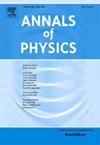一阶形式的爱因斯坦-卡尔坦理论重正化
IF 3
3区 物理与天体物理
Q2 PHYSICS, MULTIDISCIPLINARY
引用次数: 0
摘要
我们研究了一阶形式的爱因斯坦-卡尔坦(EC)理论,它具有衍射和局部洛伦兹不变性。我们在巴塔林-维尔科夫斯基(Batalin-Vilkovisky)形式主义的框架内研究了这一理论的重正化性,它允许进行轨距不变的重正化。利用背景场方法,我们讨论了背景有效作用的规不变性,并分析了反映欧共体理论对称性的沃德等式。作为应用,我们在一般背景规中计算了一环阶的四元场自能。本文章由计算机程序翻译,如有差异,请以英文原文为准。
Renormalization of the Einstein–Cartan theory in first-order form
We examine the Einstein–Cartan (EC) theory in first-order form, which has a diffeomorphism as well as a local Lorentz invariance. We study the renormalizability of this theory in the framework of the Batalin–Vilkovisky formalism, which allows for a gauge invariant renormalization. Using the background field method, we discuss the gauge invariance of the background effective action and analyze the Ward identities which reflect the symmetries of the EC theory. As an application, we compute, in a general background gauge, the self-energy of the tetrad field at one-loop order.
求助全文
通过发布文献求助,成功后即可免费获取论文全文。
去求助
来源期刊

Annals of Physics
物理-物理:综合
CiteScore
5.30
自引率
3.30%
发文量
211
审稿时长
47 days
期刊介绍:
Annals of Physics presents original work in all areas of basic theoretic physics research. Ideas are developed and fully explored, and thorough treatment is given to first principles and ultimate applications. Annals of Physics emphasizes clarity and intelligibility in the articles it publishes, thus making them as accessible as possible. Readers familiar with recent developments in the field are provided with sufficient detail and background to follow the arguments and understand their significance.
The Editors of the journal cover all fields of theoretical physics. Articles published in the journal are typically longer than 20 pages.
 求助内容:
求助内容: 应助结果提醒方式:
应助结果提醒方式:


